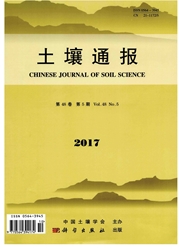

 中文摘要:
中文摘要:
目前,由人类活动造成的陆地生态系统氮输入量已经远远超过了其自身的生物固氮,外源氮输入的增多已经并将继续对土壤有机碳矿化和凋落物分解产生影响。本文分析了国内外有关氮输入增多对土壤有机碳矿化和凋落物分解的影响及其机理:由于研究点环境状况不同,凋落物性质的差异和分解阶段的不同等原因,氮输入对土壤有机碳矿化的结果主要表现为抑制或促进作用;对凋落物分解的影响表现为促进、无影响和抑制三种效果,有关其作用机理还有待进一步深入研究。着重指出对于作为大气CO2“汇”的沼泽湿地,氮输入的增多能够对其碳“汇”功能产生影响,因此进行氮输入对湿地土壤有机碳矿化和凋落物分解方面的研究,对于探讨湿地碳循环对外源氮输入的响应及其机理非常重要。
 英文摘要:
英文摘要:
Human activities such as combustion of fossil fuels, intensive agriculture and stockbreeding, have significantly altered the global nitrogen cycle in the last several decades, which has been doubled the natural rate of N fixation. Chronically elevated N inputs to the terrestrial ecosystem have influenced and will influence carbon mineralization and litter decomposition, which controlling nutrient cycling, soil formation, soil fertility, and primary productivity. This paper deals with the effects of elevated nitrogen input on soil organic carbon mineralization and litter decomposition. Because of the differences in environmental conditions, litter quality or decomposition phases, the effects of N input on soil organic carbon mineralization can be positive or negative. The same as carbon mineralization, litter decomposition have positive, negative or no effects in response to enhanced N supply. There are many inconsistent hypotheses about those phenomena, and need for further research about their mechanisms. Hence, elevated N inputs lead to an effect on carbon sequestration capability and global C cycle. Therefore it is necessary to develop researches on the effects of elevated nitrogen input on soil organic carbon mineralization and litter decomposition in wetland ecosystems.
 同期刊论文项目
同期刊论文项目
 同项目期刊论文
同项目期刊论文
 Dependence of wheat and rice respiration on tissue nitrogen and the corresponding net carbon fixatio
Dependence of wheat and rice respiration on tissue nitrogen and the corresponding net carbon fixatio Dynamics of soil organic carbon and its fractions after abandonment of cultivated wetlands in northe
Dynamics of soil organic carbon and its fractions after abandonment of cultivated wetlands in northe Quantifying net ecosystem carbon dioxide exchange of a short-plant cropland with intermittent chambe
Quantifying net ecosystem carbon dioxide exchange of a short-plant cropland with intermittent chambe Simulating crop net primary production in China from 2000 to 2050 by linking the Crop-C model with a
Simulating crop net primary production in China from 2000 to 2050 by linking the Crop-C model with a Effects of the conversion of marshland to cropland on water and energy exchanges in northeastern Chi
Effects of the conversion of marshland to cropland on water and energy exchanges in northeastern Chi Quantifying direct N2O emissions in paddy fields during rice growing season in mainland China: Depen
Quantifying direct N2O emissions in paddy fields during rice growing season in mainland China: Depen Contribution of winter fluxes to the annual CH4, CO2 and N2O emission from freshwater marshes in the
Contribution of winter fluxes to the annual CH4, CO2 and N2O emission from freshwater marshes in the 期刊信息
期刊信息
